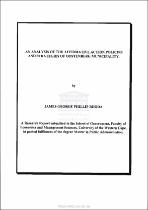| dc.contributor.advisor | Mphaisha, Chisepo | |
| dc.contributor.author | Rhoda, James George Phillip | |
| dc.date.accessioned | 2020-11-12T12:50:13Z | |
| dc.date.available | 2020-11-12T12:50:13Z | |
| dc.date.issued | 1999 | |
| dc.identifier.uri | http://hdl.handle.net/11394/7477 | |
| dc.description | Masters in Public Administration - MPA | en_US |
| dc.description.abstract | Local authorities in the Western Cape have all initiated affirmative action policies to address past discrimination and ethnic inequalities, however ineffectual they may have been up to now. The debate arises; what kind of programme should be adopted to address
issues such as discrimination, economic and social upliftment for disadvantaged groups and individuals? Oostenberg local authority organisation in the Western Cape is a functionary in the socio-economic rejuvenation of the poverty stricken, formerly deprived
and most oppressed people of the Cape Metropolitan area. Transformation has not heralded the implementation of developmental strategies or the initiation of programmes, to address the huge inequalities that exist between black and white communities. This
study argues that Affirmative Action should address holistic transformation of disadvantaged groups and individuals, to utilise the development potential of society to it's maximurn. The racial inequalities that pervade all aspects of life in South Africa are major factors
contributing to racial hatred and civil disobedience. Apartheid has been formally eradicated from the South African Constitution, however, the vast differences between the opulent white minority and the increasing black majority is a reason for concern. Legislation has
been promulgated to ensure that all private and public sector organisation adhere to, and commit themselves to the elimination of unfair discrimination in the workplace, however no amount of legislation can assure peace and harmony in a society filled with hatred.
Affirmative action has been recognised as an agency to eradicate inequalities in income and status and to develop the human potential and ability. Those who benefit from affirmative action policies should be defined in terms of objective socio-economic principles, such as living conditions, education and income levels, to ensure that programmes target the genuinely disadvantaged. The growing feeling of
discontent in the Western Cape is cause for concern and this is fuelled by the incorrect implementation of affirmative action.
This study will utilise statistics, records, documents and interviews to obtain a detailed and descriptive analysis of strategies and policies thus far implemented in the Oostenberg Municipality. It is also the contention of this study that this organisation has applied limited policies and strategies to overcome the corrosive effects of discrimination. | en_US |
| dc.language.iso | en | en_US |
| dc.publisher | University of Western Cape | en_US |
| dc.subject | Oostenberg Municipality | en_US |
| dc.subject | Local Government in South Africa | en_US |
| dc.subject | Cape Metropolitan | en_US |
| dc.subject | Transformation | en_US |
| dc.subject | South African Constitution | en_US |
| dc.subject | Western Cape | en_US |
| dc.title | An analysis of the affirmative action policies and strategies of Oostenberg Municipality | en_US |
| dc.rights.holder | University of Western Cape | en_US |

